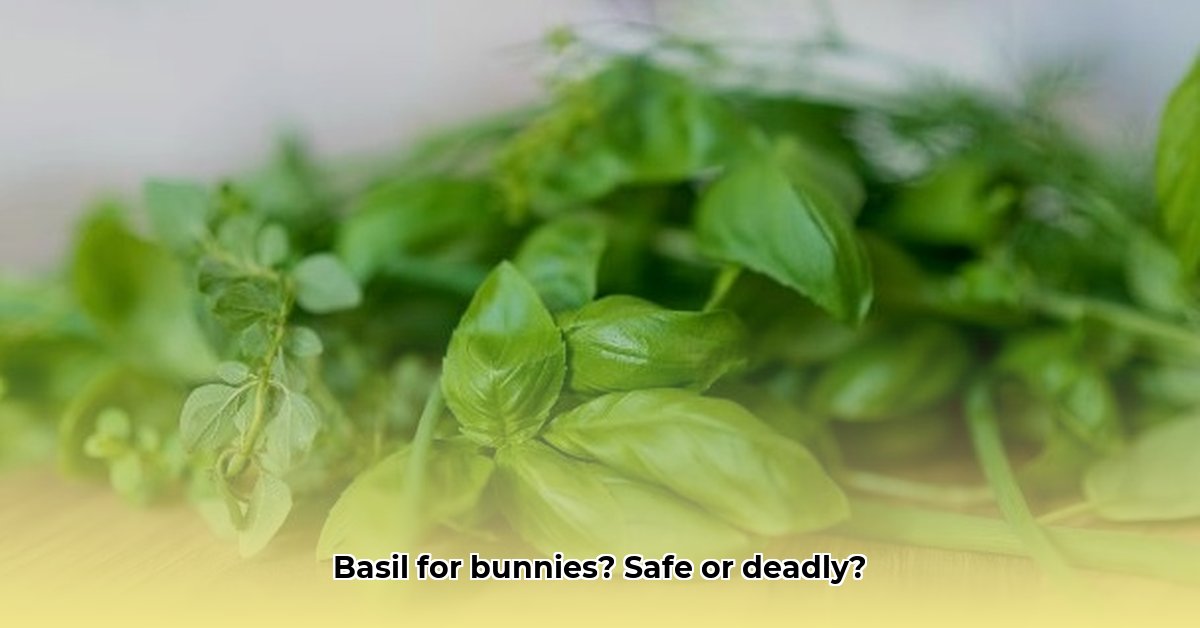A Tasty Treat: Introducing Basil to Your Rabbit
Want to spice up your bunny’s mealtime with something fresh and fragrant? Basil can be a healthy and delicious addition to your rabbit’s diet, but like all good things, moderation is key. This guide will walk you through everything you need to know about safely sharing basil with your long-eared companion.
Why Basil Can Be Beneficial
Basil isn’t just a flavorful herb; it offers some nutritional benefits for rabbits. It contains vitamins A and K, important for vision and blood clotting, respectively. You’ll also find calcium for strong bones and teeth, potassium for muscle function, and antioxidants that may help protect against cell damage. While these nutrients are beneficial, it’s important to remember that basil should be a supplemental treat, not a replacement for hay, pellets, or other essential vegetables.
Potential Risks and Precautions
While basil is generally safe for rabbits, overfeeding can lead to digestive issues like diarrhea or gas. The calcium in basil, while beneficial in small quantities, can contribute to bladder stones if consumed in excess. This is especially relevant for rabbits already predisposed to this condition. Always wash basil thoroughly before offering it to your rabbit to remove any potential pesticide residues.
A Step-by-Step Guide to Feeding Basil
-
Introduce Gradually: Start with one or two small basil leaves for adult rabbits. Avoid giving basil to baby rabbits (under 12 weeks old) as their digestive systems are still developing.
-
Monitor for Reactions: Observe your rabbit closely after introducing basil. Look for any signs of digestive upset, such as diarrhea, lethargy, changes in appetite, or altered droppings. If any of these occur, discontinue basil and consult your veterinarian.
-
Increase Slowly (If Tolerated): If your rabbit enjoys basil and shows no adverse reactions, you can gradually increase the amount, but keep portions small. A few leaves a few times a week is sufficient.
-
Variety is the Spice of Life: Most basil varieties (sweet basil, Thai basil, lemon basil) are safe for rabbits. Introduce new varieties one at a time to monitor for any individual sensitivities. You can offer both leaves and stems. While fresh basil is preferred, dried basil (without added spices or seasonings) can be offered in moderation.
Basil for Bunnies: Quick Reference
| Feature | Details |
|---|---|
| Serving Size | 1-2 small leaves for adults, none for babies |
| Benefits | Vitamins A & K, calcium, potassium, antioxidants |
| Potential Risks | Digestive upset (if overfed), potential for bladder stones with excessive calcium intake, rare sensitivities |
| Preparation | Wash thoroughly, fresh or dried (plain, no additives) |
Beyond Basil: Expanding Your Rabbit’s Diet
Hay should always be the foundation of a rabbit’s diet, along with fresh water and a variety of safe vegetables. Leafy greens like romaine lettuce, kale (in moderation), and cilantro can be incorporated. Fruits should be offered sparingly as treats due to their sugar content. Always research or consult with a rabbit-savvy veterinarian before introducing any new food to your rabbit’s diet.
FAQs
- Can baby rabbits eat basil? No, their digestive systems are not yet ready to handle basil.
- What if my rabbit eats too much basil? Watch for signs of digestive distress and contact your veterinarian if you notice any problems.
- Can rabbits eat different types of basil? Yes, most common varieties are safe in moderation, but introduce each new type gradually.
Ongoing Research
While the current consensus suggests that basil, in moderation, can be a safe and enjoyable treat for adult rabbits, research in rabbit nutrition is ongoing. Some experts believe that certain compounds in herbs like basil could have long-term effects on rabbits’ health, but further studies are needed. Individual rabbits may also react differently to basil. Always observe your pet closely and consult with a veterinarian for personalized dietary advice. This ensures you’re providing your rabbit with the best possible care based on the most up-to-date information.
- Food Making Kits Bring Easy, Fun Homemade Dishes to Your Kitchen - February 5, 2026
- Cooking Kits Make Mastering New Recipes Fun for Everyone - February 4, 2026
- Leak-Proof Glass Food Containers with Locking Lids Keep Food Fresh - February 3, 2026










